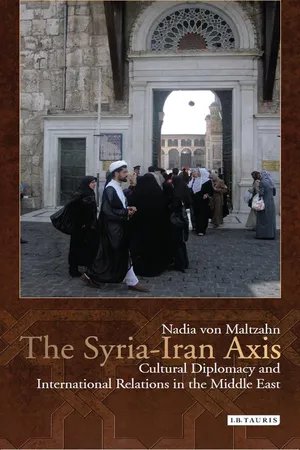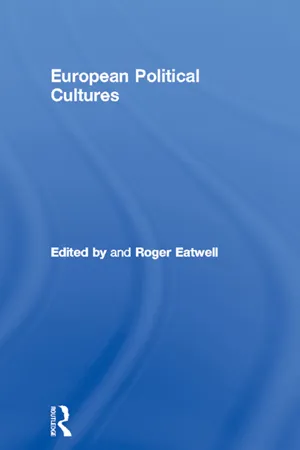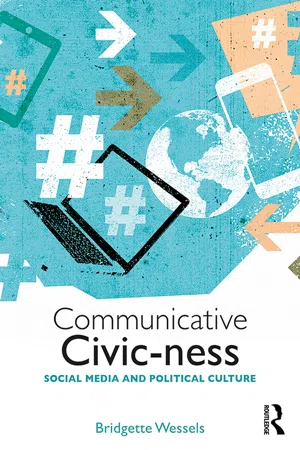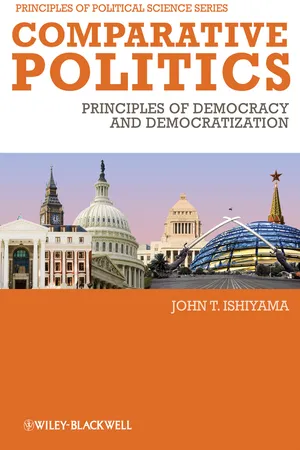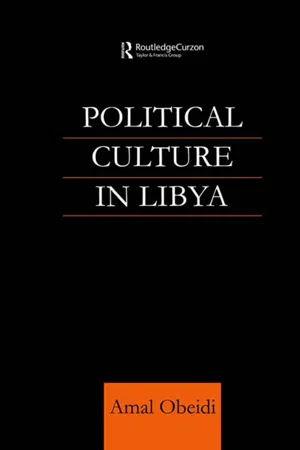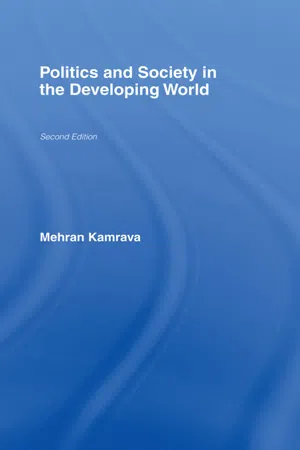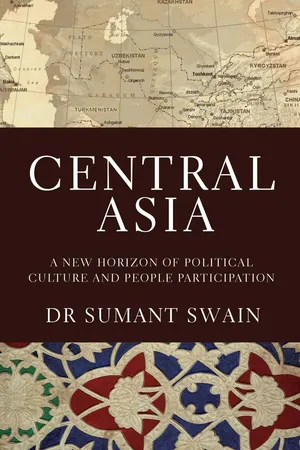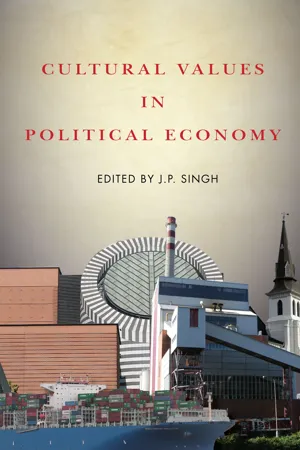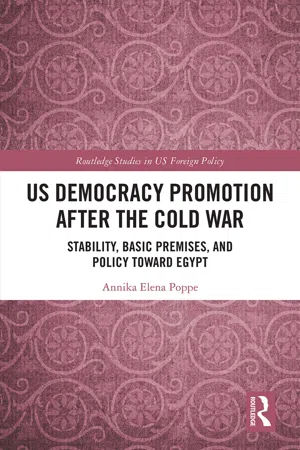Politics & International Relations
Cultural Approach
The cultural approach in politics and international relations examines how cultural factors, such as beliefs, values, and norms, shape and influence political behavior, policies, and interactions between states. It emphasizes the significance of culture in understanding political phenomena and highlights the impact of cultural differences on international relations, diplomacy, and conflict resolution.
Written by Perlego with AI-assistance
Related key terms
Related key terms
1 of 4
Related key terms
1 of 3
9 Key excerpts on "Cultural Approach"
- eBook - ePub
The Syria-Iran Axis
Cultural Diplomacy and International Relations in the Middle East
- Nadia von Maltzahn(Author)
- 2013(Publication Date)
- I.B. Tauris(Publisher)
Attracting and co-opting the people of another state through the use of culture and political values lie at the core of cultural diplomacy. A study undertaken by the British think tank DEMOS asserts that culture has a vital role to play in international relations today; ‘as culture incorporates wider, connective and human values, it is the means by which we come to understand others’. According to the study, ‘cultural exchange provides the forum to appreciate points of commonality and understand motivations and humanity that underlie differences’. We should think of culture as providing the operating context for politics. 6 The term culture is understood in a broad sense, to include not only the arts and heritage, but also value systems, traditions and beliefs. Anthony Haigh, former Director of Education and Cultural and Scientific Affairs of the Council of Europe, applies the term cultural diplomacy to ‘the activities of governments in the sphere – traditionally left to private enterprise – of international cultural relations.’ 7 Former British Council officer John Mitchell in his work on international cultural relations distinguishes between ‘cultural diplomacy’ and ‘cultural relations’, the former being essentially the ‘business of governments’, in short, to negotiate cultural agreements between states and put them into action, the latter being more comprehensive and not limited to government activities. Ideally, the execution of cultural exchange would be carried out through cultural relations rather than through diplomats or cultural officials, as the latter are closely aligned with official policy and national interest - eBook - ePub
- Roger Eatwell(Author)
- 2002(Publication Date)
- Routledge(Publisher)
22The leading contemporary American defender of the Cultural Approach to politics, Ronald Inglehart, has argued that the political culture approach argues (1) that people’s responses to their situations are shaped by subjective orientations, which vary cross-culturally and within sub-cultures; and (2) that these variations in subjective orientations reflect differences in socialisation experience, with early learning conditioning later learning.23 He adds that cultural theory implies that culture cannot be changed overnight, though the young are easier to influence. Indeed, observed cross-cultural differences reflect the experience of generations, even centuries, rather than relatively short-run factors.Inglehart’s main work has been based on large-scale opinion poll surveys, including the European Union’s Eurobarometer, and surveys remain a central tool in the Cultural Approach. Kavanagh’s distinction between affective and evaluative support also remains an important part of the political scientists’ armoury. For example, studies of the attempt by the Western Allies after 1945 to remake Germany’s authoritarian political culture were for a long time concerned with the fear that opinion poll evidence showing growing support for democracy was really picking up a feel-good factor which resulted from West Germany’s economic miracle.24 Recent studies of East German attitudes towards reunification have similarly been concerned that the basis of support lay more in instrumental economic expectations than in deep-rooted admiration for the (West) German political system and society. Eurobarometer - eBook - ePub
Communicative Civic-ness
Social Media and Political Culture
- Bridgette Wessels(Author)
- 2018(Publication Date)
- Routledge(Publisher)
There is a great deal of debate about the ways in which it is theorised, including its precise definition, concepts and relationships between concepts. However, political culture is generally understood to mean a ‘set of attitudes, beliefs and sentiments that give order and meaning to a political process and which provide the underlying assumptions and rules that govern behaviour in the political system’ (Darity 2008). In overall terms, political culture seeks to address and include the political ideals of a polity as well as its operating norms. Hence, political culture is seen as both the product of a political system’s history and the histories of the system’s members, and as being rooted in public events and private experiences. Political culture features in the shaping of political communication because it involves values, affinities, conflicts, networks and knowledge, which all frame the practices of communication and types of discussion within the civic realm (Dahlgren 2003). In 1956 Gabriel Almond introduced the idea of political culture, and developed this further in collaboration with Verba in their 1963 book, The Civic Culture. Almond and Verba wanted to examine the ways in which people affect political systems, as well as the ways that political systems affect people. To achieve this, they looked at the idea and role of ‘culture’ in social life, since culture (however that is defined) provides a fabric of social life that is meaningful to individuals. Conversely, social life itself becomes meaningful through people’s interpretations and actions. Thus, in many ways individuals are socialised into their culture, but they also produce and reproduce it. Almond and Verba (1963) argue that culture is a significant influence on shaping social life which can also act as a constraint on it, because of its relative power. Political systems and culture are distinctive from one another and can exist in a variety of different relationships to each other - eBook - ePub
Comparative Politics
Principles of Democracy and Democratization
- John T. Ishiyama(Author)
- 2011(Publication Date)
- Wiley-Blackwell(Publisher)
The idea that political culture involved something much more fundamental than attitudes and orientations about particular political systems was particularly appealing to many European scholars, working at about the same time as Elkins and Simeon. These scholars took a much broader view of political culture, rather than attitudes associated with particular kinds of political systems (as had Almond and Verba and Lijphart). David Robertson (1985, p. 263) defines political culture as “the totality of ideas and attitudes towards authority, discipline, governmental responsibilities and entitlements.” Richard Rose (1980, pp. 116–117) thinks of political culture as sets of “values, beliefs and emotions,” that are “taken for granted” by individuals and essentially “give meaning to politics.” Dennis Kavanagh (1985) thinks of political culture in a similar way, arguing that it “disposes its members to regard certain forms of political behaviour and institutions as ‘normal’ and others as ‘abnormal.’ ” Richard Topf (1989) thinks of political culture as comprised of attitudes and stances that people adopt to make sense of politics. Topf proposes that political attitudes are viewed as “expressions of ‘values,’ or better, of positions in the moral order, constitutive of the political culture.” Stephen Welch (1993, p. 34) provides yet another way to think of political culture, not so much as a set of assumptions, but as a set of “resources.” According to this approach, political culture supplies images, symbols, myths, traditions, which enable people to make sense of their situation or predicament which generates certain needs that influence the selection and interpretation of the available cultural resources. Thus, the original notion that political culture was associated with attitudes about particular political systems has increasingly been replaced with the idea that political culture is a set of attitudes and orientations that help people make sense of politics. - eBook - ePub
- Amal S M Obeidi, Amal Obeidi(Authors)
- 2013(Publication Date)
- Routledge(Publisher)
21Despite some differences, all the above definitions share the idea that all the values found in the political system are part of political culture.22 Political culture is regarded as a subculture, or as a part of the general culture of society. Political culture is seen as something which can change slowly and gradually, reflecting general changes in the socio-economics and politics of any society.A CRITICISM OF POLITICAL CULTURE
Since the publication of Almond and Verba's work in the 1960s, the concept and theory of political culture has been attacked by scholars from a variety of perspectives. One line of criticism was directed at the definition of political culture. Lijphart and Pateman were prominent advocates of such criticism. Lijphart criticised Almond and Verba for their broad definition of the term political culture, going beyond orientations towards political objects to include general social and interpersonal relations.23 He argued that such definition introduced vagueness to the term. This vagueness could be avoided by limiting political culture as a concept to the explicitly political. In Lijphart's discussion of Almond and Verba's work the Civic Culture , he adhered to the narrow definition of political culture and concentrated on the ‘links between political culture as independent variable and political structure as the dependent variable, leaving aside the antecedent influence of the social structures and processes.’24 - eBook - ePub
- Mehran Kamrava(Author)
- 2012(Publication Date)
- Routledge(Publisher)
5 Political cultureSocial change brings with it alterations in the prevailing values of Third World societies and inevitably results in a certain degree of political instability. Through social change, the cultural orientations of a population are altered, with new norms of conduct and of thought, new ways of life, gaining increasing legitimacy among various social classes. The previous chapter discussed how these valuational changes affect the social and cultural characteristics of developing countries. It is now important to examine the relationship between social and cultural values on the one hand and the body politic on the other. The nature and ramifications of the nexus between culture and polity can be best understood through political culture. By examining the role and significance of political culture in developing countries, this chapter explores the popular political perceptions and orientations that prevail throughout the developing world, the means through which these attitudes are formed and the effects they have on political behaviour and participation.There has recently been considerable scholarly debate on the conceptual definition of political culture and the role it plays in the political process.1 At the most elementary level political culture refers to the cultural values that govern political behaviour. In their pioneering work on the subject Almond and Verba defined political culture as the ‘particular distribution of patterns of orientation toward political objects among the members of the nation’.2 They saw political culture as the connecting link between micro- and macro-politics, with popular political perceptions and orientations having direct bearing on a country’s political institutions and prevailing patterns of political behaviour.3 Thus political culture affects ‘the conduct of individuals in their political roles, the content of their political demands, and their response to laws’.4 Along similar lines, a number of other definitions have also been put forward, seeing political culture as ‘the particular pattern of political orientation to political action in which each political system is embedded’,5 ‘the overall distribution of citizens’ orientations to political objects’,6 or as ‘all the important ways in which a person is subjectively oriented toward the essential elements in his political system’.7 More recently, a somewhat different interpretation of political culture has been offered, arguing that it consists of ‘all publicly common ways of relating’ to political symbols.8 - eBook - ePub
Central Asia: Horiozon of Political Culture and People Participation
Horiozon of Political Culture and People Participation
- (Author)
- 2014(Publication Date)
- KW Publishers(Publisher)
While a universally applicable concept is crucial for broadening the scope of cultural studies, attention should also be paid to “the uniqueness of any culture’s approach to politics”. Reducing diverse criteria to some lowest common denominator for cross-cultural studies is unsatisfactory, giving insufficient attention to the richness and uniqueness of different cultures.- Comparability
A well-defined political culture concept must permit not only meaningful comparisons between cultures but also meaningful comparisons between different aspects of a single culture. Intra-cultural comparisons are as important as intercultural ones, because such comparisons allow one to see and understand the role of internal dynamics of a society that play in effecting political change.- Objective Testability
The concept of political culture must be capable of generating hypotheses that can be tested for validity in terms of some objective standards against empirical data—but such objective standards are currently lacking in the study of political culture.After mentioning these criteria, Chilton argues that a definition of political culture must meet these requirements and those which fail the test are not conceptually acceptable.31 He also defines political culture as the shared way of relating among a group or groups of people.Political culture theory defines political culture in this fourfold way:- It consists of the set of subjective orientations to politics in a national population or subset of a national population.
- It has cognitive, affective and evaluative components. It includes knowledge and beliefs about political reality, feelings with respect to politics, and commitments to political values.
- The content of political culture is the result of childhood socialisation, education, media exposure and adult experiences with governmental, social and economic performance.
- Political culture affects political and governmental structure and performance. The causal arrows between culture and structure and performance go both ways.32
- eBook - ePub
- J.P. Singh(Author)
- 2020(Publication Date)
- Stanford University Press(Publisher)
Methodologically, our contribution rests on showing how cultural beliefs and cultural values may be usefully operationalized in political economy with various techniques. By studying values, we avoid cultural stereotypes and provide a variable and dynamic language to empirically analyze cultures. A set of values may be identified with a culture or a subset of it. The authors present both qualitative and quantitative analyses in examining these cultures. More importantly, operationalizing culture does not mean specifying it as an antecedent condition or a secondary or residual variable. A complex relationship exists between culture and political economy in functional and constitutive ways. This chapter argues for an approach that shows how both materialist and cultural factors determine values and interests. Most authors in this book attend to a discussion of cultural values. In doing so, they implicitly endorse multiple and mixed methods. We present or borrow cultural analyses rooted in ethnography, history, case studies, process tracing, and quantitative techniques. These are suggestive of the kinds of conceptual and methodological criteria that can be employed to understand culture. This is not an attempt to paper over differences: we are not convinced that the intersection of culture and political economy can only be studied through inferential techniques (King, Keohane, and Verba 1994) or historically rich theories (Puchala 2003). Finally, we contribute through our empirical examples. They are by no means exhaustive of culture and political economy analyses, but their geographic, temporal, and issue coverage explores the work of cultural values and alternatives at multiple levels.The chapters seek to provide thick descriptions of cultural stability and change, useful for analyzing the puzzles arising from the links between culture and political economy. Political economy can often appear abstract and ambiguous in a world of reified strategic or rational calculations that seem devoid of origins and unable to explain complex cultural interactions. The acculturations infused in this book provide both a historical and humanized view of the world, albeit one that accords human agency a repertoire of options.Notes 1 - eBook - ePub
US Democracy Promotion after the Cold War
Stability, Basic Premises, and Policy toward Egypt
- Annika Elena Poppe(Author)
- 2019(Publication Date)
- Routledge(Publisher)
What are the mechanisms through which culture influences foreign policy? In order to be able to provide some kind of explanation for foreign policy behavior, potential causal pathways need to be theorized. Whereas the lack of basic agreement on a definition of ‘culture’ naturally forecloses a definite answer to this question as well, Duffield (1999: 771–772) has identified four very broad ways in which culture can have an impact on foreign policy behavior: Culture (1) ‘helps to define the basic goals of the collectivity’ and (2) ‘shapes perceptions of the external environment’. It moreover (3) ‘shapes the formulation and identification of the behaviors available for advancing or defending the group’s interests in a particular context’, and (4) it ‘can strongly influence the evaluation of the seemingly available options and thus the choices that are made among them’. Duffield (1999: 772) considers it to be the ‘overall effect of culture’ to provide a predisposition for ‘collectivities toward certain actions and policies rather than others’. This means that the range of behavior and policy options is limited by considerations of what is right and appropriate, potentially effective, or counterproductive.There are two conditions under which a strong impact of culture on foreign policy is most likely. First, this concerns phases ‘when the international setting is characterized by relatively high levels of complexity, uncertainty, and ambiguity’ (Duffield 1999: 777). Under these conditions, problems and potential solutions are less distinct and definite, and policy makers tend to lean on the background of experience and beliefs available to them, just as in general, when faced with uncertainty, ‘humans turn to collective ideas to inform action and learn, not simply to the objective external world’ (Legro 2000: 430). Second, political culture will strongly influence foreign policy in states in which policymaking is not the sole prerogative of an individual or a group of individuals, with cultural resonance being probably greatest in representative democracies (Duffield 1999: 777). In terms of delineating the limits of culture as an explanatory factor of foreign policy, culture can sometimes be ‘vague or incomplete’ on the one hand, and it may also be ‘internally inconsistent’ on the other, and thus of not much use in shaping the policymaking process (Duffield 1999: 778). Moreover, thinking about culture may help very little when a single dominant political culture is missing and the state is characterized by competing cultural subgroups. When staking out the field of U.S. democracy promotion policy, close attention is afforded to whether or not the factors that favor or restrain the influence of cultural dispositions are at play, and this question is addressed again in the conclusion.
Index pages curate the most relevant extracts from our library of academic textbooks. They’ve been created using an in-house natural language model (NLM), each adding context and meaning to key research topics.
Explore more topic indexes
Explore more topic indexes
1 of 6
Explore more topic indexes
1 of 4
